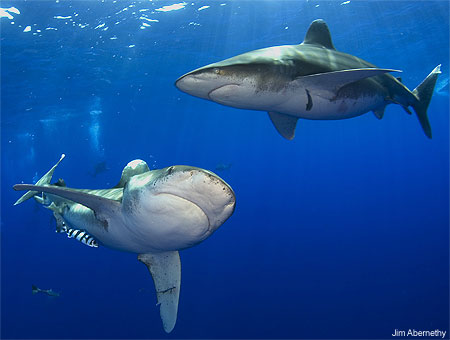Shark Species Gains First Regional Protection in Eastern Pacific Ocean
 The Pew Environment Group applauds a decision reached on the final day of the Inter-American Tropical Tuna Commission (IATTC) meeting to protect oceanic whitetips, the first shark species accorded such consideration at the regional level in the eastern Pacific Ocean.
The Pew Environment Group applauds a decision reached on the final day of the Inter-American Tropical Tuna Commission (IATTC) meeting to protect oceanic whitetips, the first shark species accorded such consideration at the regional level in the eastern Pacific Ocean.
At the meeting in La Jolla, Calif., U.S., governments agreed that the stocky, easily recognizable oceanic whitetip shark must be released if captured in tuna-fishing nets and on longlines, a type of gear that extends underwater up to 30 miles. The IATTC is responsible for managing tuna fisheries across an area of about 68 million square kilometres (26 million square miles).
Whitetips are virtually disappearing from the ocean because they are killed in fishing gear and pursued for their fins, which are used in the Asian delicacy shark fin soup.
Pew congratulates Japan and the European Union for sponsoring this proposal and acknowledging the grave situation of this species. In a clear demonstration of shark conservation, the United States spoke in strong support of this proposal, as did China and Chinese Taipei.1
The International Commission for the Conservation of Atlantic Tunas (ICCAT), a regional tuna management organization for the Atlantic Ocean, passed a similar conservation measure for oceanic whitetips in November 2010.
IATTC rejected two other shark conservation actions after lengthy debate.
A number of Latin American countries proposed improvements to current shark management measures, including a decision requiring that every captured shark be brought to land with its fins naturally attached.
This proposal would have helped reduce the practice of finning—when the fins are cut from a sometimes living shark at sea and the animal is then thrown back into the water to die. Up to 73 million sharks are killed annually to support the global fin trade.
A second proposal by the EU to fully ban the retention of hammerhead sharks, which would have worked in a similar way to the oceanic whitetip measure, was also defeated. Hammerhead sharks are threatened globally, largely due to the high demand for their fins but also because of their slow maturity and ability to reproduce.
Pew hopes that more conservation measures for hammerhead and other sharks will be adopted by the IATTC and other regional fisheries management organizations. Given the pervasive threats to these top marine predators, and their importance to the healthy functioning of ocean ecosystems, urgent action is needed for their protection.
1 Chinese Taipei is the name under which Taiwan, Province of China, participates at IATTC.






